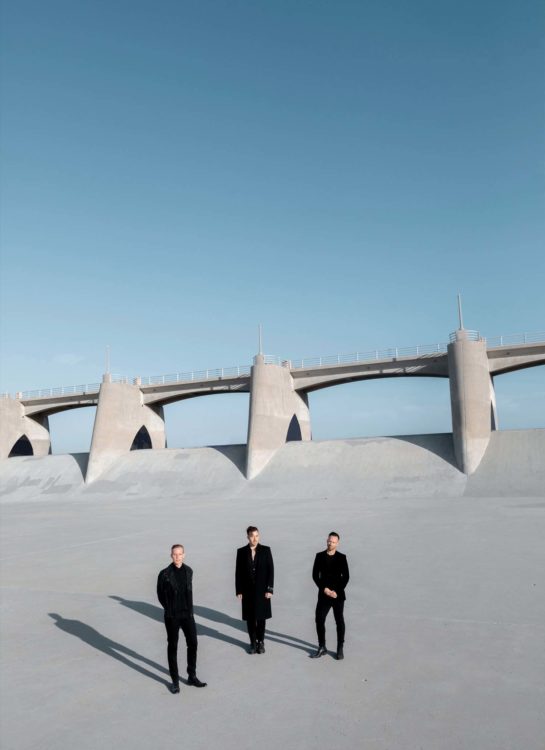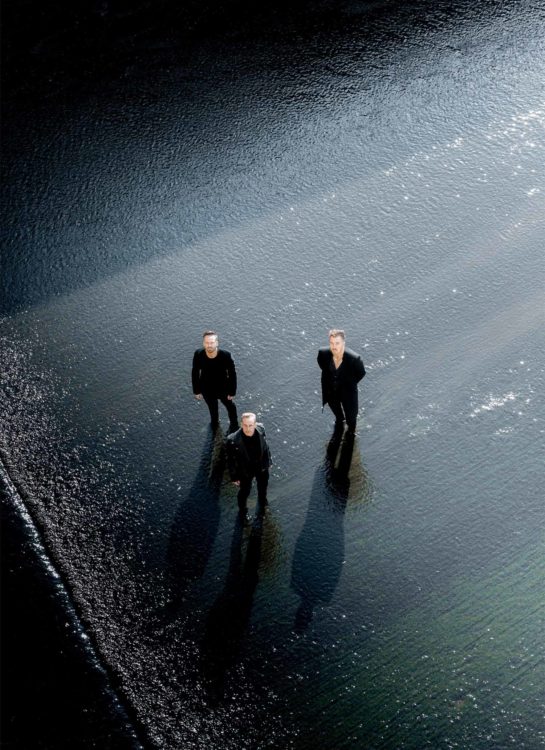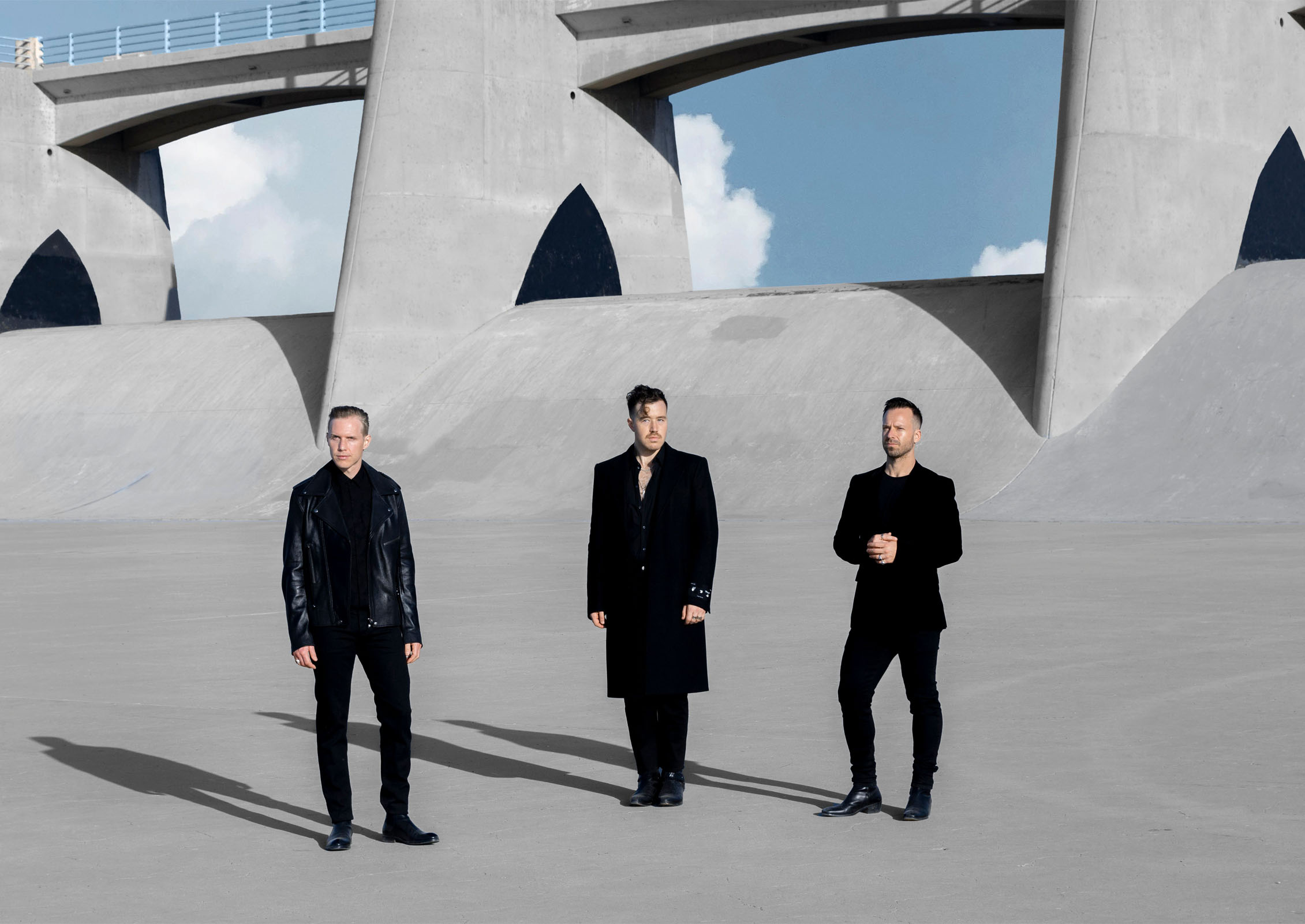- Words Sam Connor
Tyrone Lindqvist of the Australia-hailing alt-dance trio, RÜFÜS DU SOL, discusses their new remixes album as their headline London show at Gunnersbury Park approaches.
With an impressive, critically acclaimed and award-winning career spanning twelve years, RÜFÜS DU SOL have earned their place in the sun.
Formed of three friends from Sydney – Jon George, James Hunt and Tyrone Lindqvist – RÜFÜS DU SOL have been on quite the journey, not only musically but as friends, bandmates and individuals.
Now boasting four incredibly successful albums that have been nominated for and won a sweep of awards, including a Grammy, the trio have shared a remixes record of their fourth album, ‘Surrender’. Artists both new and established from across the electronic music spectrum lend a hand, giving the already popular ‘Surrender’ a new lease of life. Heavy hitters such as Dom Dolla and Solomun have added their own spin to tracks, while rising producers Carlita and Anyma – amongst many others – also show what they’re made of.
Notion sat down with one third of the group, Tyrone Lindqvist, to talk about their journey, the surrealism of winning a Grammy, ‘Surrender’ remix album, Tulum festival and what they want their legacy to be. Dive in!
Rufus Du Sol play their biggest ever UK headline show on August 20th at Gunnersbury Park, London, tickets available here.
Their new ‘Surrender Remixes’ album featuring Monkey Safari, Anyma, Carlita, Cassian, Magdalena & More is out now, stream at https://rufusdusol.lnk.to/surrenderremixes.


Your fourth album ‘Surrender’ was released last October. Looking back at your records, how do you feel you have evolved – both sonically and as a band?
I think that we’ve evolved a lot really. We’ve been in the band for 12 years together and we’ve undergone a lot of change in our personal lives. Our first record was written in Australia, where we met as friends and our second one was predominantly in Berlin, and then we finished in Australia, and then the third one in LA, and the fourth, also in LA and Joshua Tree. So just geographically, all those things influence us, being in new environments. It was very exciting moving to LA for the first time. It’s a bit of a washing machine of a city in that it’s really fun and there’s great opportunities, but it is easy to lose yourself in that city. I can speak for myself, I definitely lost myself somewhat. Didn’t lose my touch with music. But yeah, it was a bit of a messy time finishing our third record. The last three years have been a really healing process for me and the guys in the band where we just re-evaluated what our values were and what where we wanted to be as a unit in the next 10 years. So, we took a trip to Joshua Tree, wrote music for two months and started each day with meditation. We talked about any resentments that we have with each other. COVID was like a pause button so that we could take the train off the tracks and just reassess where we want it to go and who we want it to be. We didn’t have an end goal. When we went to Joshua Tree, we just wanted to make music and it was very freeing musically. We made beats and we were just exploring music that we hadn’t really allowed ourselves the time to make before, like break beats. And then when we got back to LA, that continued; a structure was the thing that we hadn’t had before. I think it was healthy for me and the guys, it was very reparative and reminded us why we started making music in the first place. All of those things make the music inherently different to our first album, but I feel like there’s a consistent thread throughout it all, just in that it’s the same three guys making music together. And there’s such a healthy push and pull between this and our personal tastes and influences. It used to be more like butting heads on the first and second album. And now it is a much more fluid process in the studio, where we take on anyone’s idea and run with it. And then if it’s not really working, we run down another rabbit hole.
“Alive” from the record won a Grammy, one of the biggest accolades that can be awarded. How did that feel?
It’s funny, like three years ago, we were nominated for our first Grammys, for our song “Underwater” and our album ‘Solace’. The Grammys were so far removed from our reality, we never pictured ourselves getting nominated so we didn’t really care about it, it just felt like something that was intangible. So getting nominated was such a big shock and it was exciting and exhilarating and very surreal at that time. And going [to the awards] it was very exciting. I didn’t care about it before it but then when you’re there, you know, you do care. It was a bummer not to walk away with an award. It’s not really about the award, but there is a part of you that gets consumed by this thing. That was somewhat deflating, even though I was very grateful for that experience. So then this time around, getting nominated, I had the full spectrum of the excitement and the loss of not walking away with an award. So I think I was a bit too nervous to get too excited, really. But it felt really like a beautiful pat on the back. I feel really grateful that we got an award at this time in our careers. I reflect back on other artists that we’ve looked up to coming out of Australia and being able to last 10 years plus is is so huge. So, it just felt like a really nice high five to get that award and the moment when our name was announced, it was a very different feeling to the last time. I wanted to cry and I had a long way to walk up to accept our award. It was a whirlwind of emotions that’s kind of hard to articulate
You have announced a ‘Surrender’ remixes record, which features some huge names from the electronic spectrum – both friends and peers – like Adriatique, Carlita, Dom Dolla, Magdalena, Cassian and more. How did you make the selections?
It’s a collaborative process between me the guys. It’s a wish list of artists that we love that are more successful, some that are newer. They all are artists that we’re excited by. It’s a lengthy process to see who’s available, who’s open to doing a remix but it’s such a cool experience to have. Music that you’ve been very closely attached to, and you’ve been making, you’re very specific as to every detail, all the little ins and outs of what make each song what it is, it’s just nice and refreshing to hand that across to someone else and to see their take on it. From someone else’s perspective, it feels like a big gift.
What do you hope fans will enjoy and take away from the remixes record?
I hope that people find artists that they really like that they might not necessarily be across. I hope that it opens people’s doors to a few artists that we personally really love. But on ‘Surrender’, the album itself, hearing some vocal melodies and lyrics in a very different context can offer something new. People connect with things differently when it’s shown in a different light. There was a time in my life where I would hear a remix of a song and it gave me a completely different perspective of the song and I really appreciated it for that. Hopefully there’s a moment for a few people out there where they go, ‘Oh, this is my song, my jam’.
This summer, you have already played a number of club shows, including DC10 for CircoLoco and Hi Ibiza, as well as opening Scorpios Mykonos. What do you love most about playing these kinds of shows?
John George and James Hunt: We’ve enjoyed DJing together at these venues we’ve had on our bucket list for a while now, kicking it off in Ibiza at the opening of Hi with Tale Of Us was such a great way to set the tone for the rest of our DJ sets throughout Europe, visiting most of the cities for the first time as well was great!

Earlier this year you also curated your own festival experience Sundream Tulum which saw them combine their live shows and DJ sets and invite some of the compilation collaborators – Magdalena, Carlita and Cassian. What inspired you to create your own festival, and why Tulum?
Tulum is a pretty magical place. I’ve been there with my wife five years ago, and all the guys kind of separately also been there with their respective partners. We’d all had our own individual experiences with the place and really loved it. John, when he went on a trip really connected with the organisers of Papaya Playa Project, the venue where we had the festival, a sustainably run hotel. We had talked about having our own event or festival across the years and it just that seemed like the right opportunity to do it where it was. It’s a beautiful destination. We could only do like 2000 tickets as the actual event couldn’t hold any more people but it was really successful. It was so amazing. And same thing with the remix project, we write down our favourite artists and which ones are attainable, which ones create the feeling that we would like to have over the three days.
What is one of the most significant things you have learned during your career?
I think one of the most significant things is – it’s probably different if you’re a solo artist, but if you’re in a group or a duo, I think the most powerful thing for us has been recalibrating; connecting and communicating as a unit, because we’ve all undergone a lot of change, and we were very different people 10/12 years ago, just in the way that we would communicate with each other our values and the way that we behaved. Underneath everything, we all share a love of music, and we have a deep connection with that. There is a push and pull in terms of our personalities – I imagine that would be the case with any healthy working relationship. It would just be every couple of years to take half an hour, a few days, whether it’s a work trip, or something that isn’t necessarily about anything other than you and that person and what you guys are creating together, and to take stock of what’s happened and where you’re at. There was a period there where we didn’t do that for a lot of years, and it felt like a big build up, and it comes up in resentment. I definitely wasn’t enjoying what we were doing for a period of time. I imagine most artists go through that. My advice would just be that you schedule that in, because working through it is definitely more gratifying than walking away from it. I feel so grateful that me and the guys make music together and that we’re still touring.
And lastly – what do you want your legacy to be?
I love albums, so I hope that if someone discovers us as an artist, I hope that they’re able to really dive into the albums. I hope that they connect with the full bodies of work that we make each time we make an album.

